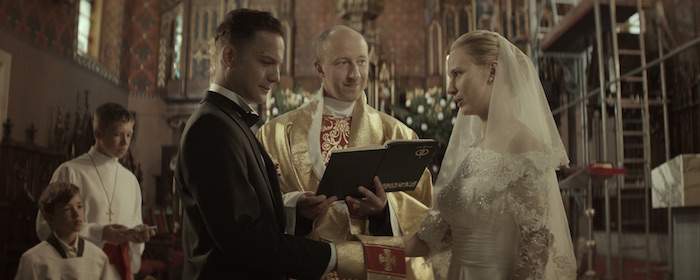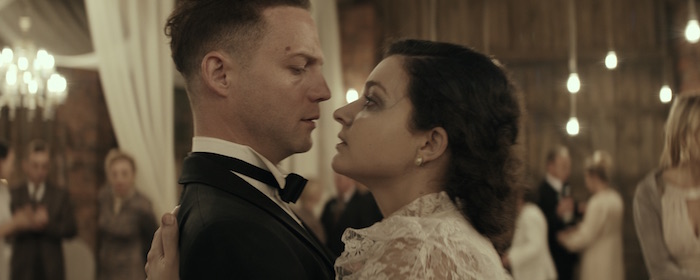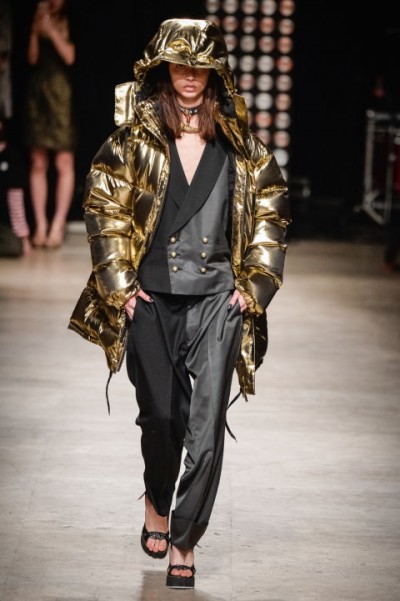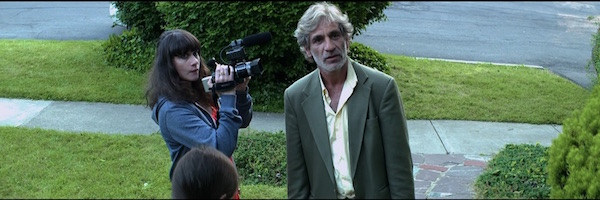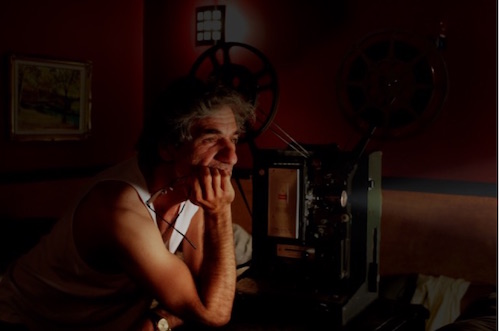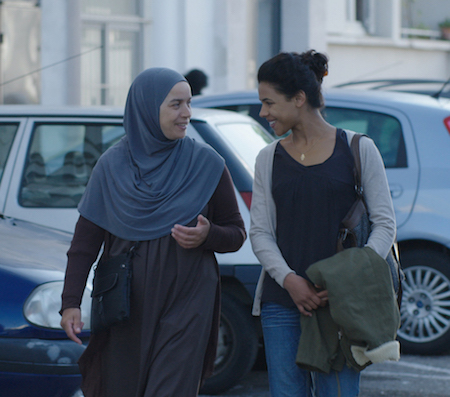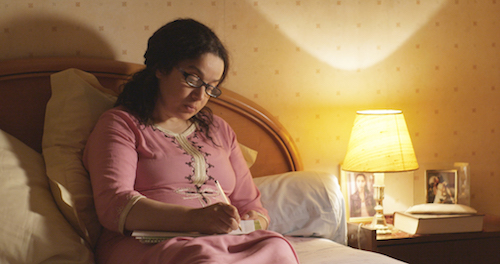- 8 years ago
-
A documentary that presents one of the most preposterous true-life scenarios ever connected with the movie business (or any business), Rob Cannan and Ross Adam’s The Lovers and The Despot also provides yet more evidence of North Korea’s bizarre sociopolitical culture and the oddity that was Kim Jong-il.
In 1978, Kim—then heir apparent to North Korea’s leadership and a major film buff—arranged for the kidnap of South Korean director Shin Sang-ok and his ex-wife, actress Choi Eun-hee. Kim was envious of South Korean cinema’s originality, unlike the stilted fare that was coming out of his artistically backwards nation, and he wanted the renowned couple to be his personal filmmakers. The Lovers and the Despot uses interviews, footage from Shin’s movies, propaganda film clips, and reenactments, underscored by Nathan Halpern’s dramatically ominous music, to show the couple’s plight and their eventual escape. The resulting documentary unfolds like an artsy international crime thriller, albeit one with a few plot holes. It’s a striking and effective approach, though just about any film covering this material would be fascinating for the story alone.
The Lovers and the Despot begins with a press conference given by Shin and Choi after their escape. It then travels back to the beginning of their relationship, as Choi recalls their initial meeting on the set of one of his films. (She provides much of the narrative; Shin died in 2006.) Scenes of the couple’s subsequent success as a top director and leading actress, respectively, are intercut with familiar, but no less jaw-dropping footage of the massive, intricately choreographed political rallies taking place in North Korea, along with the rise of Kim Jong-il in the shadow of his revered father, Kim Il-sung. Shin and Choi’s now-grown adopted children talk about their parents’ careers, including Shin’s obsession with filmmaking and his overspending on production. Eventually he would take up with a younger actress, after which he and Choi divorced.
Soon after, Choi disappears from her hotel in Hong Kong, where she has traveled to meet with prospective film producers. Later, while searching for her, Shin also vanishes. His career having been in decline, there are rumors that he defected to North Korea.
Though their abductions and captivity are traumatic—he is kept at a detention center for years—Kim treats them both with respect and good humor, as we hear in conversations that they somehow recorded (one wonders how they managed this). These tapes, once they reached the West, would be the first time that anyone in the U.S. heard the supreme leader’s voice, according to one State Department operative. Declaring their loyalty to North Korea, both Choi and Shin gain Kim’s trust and are allowed to attend film festivals in Russia and Europe, albeit under heavy guard. Eventually the couple, who have been held separately, are reunited.
Shin would make 17 films for Kim, including the first love story ever seen on North Korean screens; smiling photos of the couple with the despot appeared in South Korean newspapers, cementing the idea that they defected. Just as The Lovers and the Despot uses clips from Shin’s feature films to illustrate aspects of the couple’s life and ordeal, Shin relies on a wealth of famous movie scenes to plot their eventual getaway. This life-imitating-art motif is one of The Lovers’ most interesting—and sometimes, amusing—aspects. Though various fascinating facets of Choi and Shin’s story are unfortunately skimmed over, the film still packs a considerable punch.
A mix of crime thriller, love story and movie biz doc, The Lovers and the Despot is an amazing story that begs to be made into a feature narrative or even a mini-series. Too bad Shin isn’t around to do the honors.
The Lovers and the Despot opens on Friday, September 23, at Landmark Sunshine Cinemas and Lincoln Plaza Cinemas, and will also be available On Demand and through Amazon Video.
—Marina Zogbi
Latest News
- 8 years ago
-
New York Fashion Week officially ended today.
If you’ve been following any news from this week’s past events:
*You would know that Hood By Air made weird fashion magic with PornHub
**Kayne West’s Yeezy Show was considered a hot mess
***Fashion insider Eva Chen was everywhere you wish you were.
https://www.instagram.com/p/BKTNjNjhA2A/?taken-by=evachen212&hl=en
Former editor-in-chief for Lucky Magazine, Chen is Instagram’s head of fashion partnerships, as well as CEO of Trend Micro. (She’s also my hero)
Over 600,000 fans keep track of the fashion maven via IG. And if you are an Instagram stalker like me, you’d know that she’s pregnant with her second child to Tom Bannister, and loves to show off her shoes from the backseat of car services. I especially love her #ootd shots, featuring designer Rosetta Getty and Tanya Taylor.
Chen is also a brilliant digital strategist. In an interview with Business of Fashion, Chen lays out five basic principles for clothing brands big and small.
Paraphrased from Business of Fashion:
- Seek real conversational engagement online. “It’s not a numbers game,” Chen says. “You can have millions of followers, but more important is whether people are commenting and tagging their friends. That means you’ve created something that people are talking about and that’s what makes a good post.”
- Possess a strong visual identity. “ust as when you pick up a magazine, whether it’s Self Service or Vogue, and you could remove the title from the cover, but you would still know which magazine it was just from the image, the typography, the talent they’re using, the tone of voice — that logic extends to Instagram as well. “
- Be authentic! “The accounts I love following most all have the sense that there are real people behind them.”
- Develop and grow a community. “The Instagram audience wants to feel like they’re a part of something. The conversation is really important — talking back to your followers, asking questions of them. It’s not something that every brand does. But I think Valentino, for example, does this very, very well.”
- Collaborate with active IGers. “Gucci is a great example. They do something called #GucciGram, where they collaborate with artists on Instagram. They have a collaboration with a painter named Unskilled Worker. “
What are you doing to cultivate a strong voice for your brand? What tools do you think you need in order to take your vision to the next level? Share with us @afpnyc!
Jacqueline Colette Prosper, yummicoco.com
- 8 years ago
-
Demon, Polish director Marcin Wrona’s third feature, is an unlikely but entertaining hybrid between a raucous wedding comedy and a brooding horror film. That he managed to pull it off at all is a testament to his talent and unique artistic sensibility. (Sadly, Wrona died of an apparent suicide at age 42 just before the film was set to premiere in Poland last fall.) Those who like their movie genres rigidly defined may be confused by Demon, which isn’t all that scary (or hilarious, for that matter), but the rest of us can appreciate its gorgeously morose ambience; dark, absurdist humor and strong performances.
Based on Piotr Rowicki’s play Adherence, Demon concerns the laid-back Piotr (Itay Tiran), who has traveled from England to the rural Polish hometown of his fiancée Zaneta (Agnieszka Zulewska), for their wedding. The couple have only known each other for a few weeks, so the groom is meeting her parents for the first time. Piotr already has an easy rapport with Zaneta’s bro-like brother and initially gets along well enough with her jocular father (Andrzej Grabowski). When he begins renovations on the family’s rundown country house where the couple will live, Piotr unearths a pile of human bones and is immediately spooked, especially when he later glimpses what appears to be a female spirit wandering around outside. Soon his sunny personality gives way to sudden dark moods, and his body begins to react (via nosebleeds) to something or someone who is slowly taking him over. The overcast sky erupts and torrential rain begins to fall.
“You seem different,” notes his future brother-in-law right before the wedding, a classic understatement. The ceremony is Catholic, as seem to be most of the guests, except for a Jewish professor who knew Zaneta’s now-deceased grandfather. At the reception, which takes place in a shabby-chic barn, the professor toasts the couple at length, quoting Aristotle. The party-happy guests barely listen to him and heckle another guest who attempts to sing a song. Fueled by alcohol, the music and dancing become wild and celebratory, though a tense atonal soundtrack punctuates the festivities, as Piotr – obsessed with the bones he found – swings back and forth between his genial normal self and a haunted vessel. As his actions become violent and alarming (Tiran does a great job with the physical manifestations of his character’s state), a humorously philosophical doctor (Adam Woronowicz) and the somewhat detached priest (Cezary Kosiński) are called upon to help figure out the problem. Though various diagnoses are thrown around (food poisoning, drug-induced psychosis), it is the professor who recognizes in Piotr the machinations of a dybbuk, the classic malevolent spirit of Jewish folklore. Zaneta’s mood goes from delirious happiness to pained acceptance.
Even as Piotr’s condition – and the wedding – get out of hand, Zaneta’s perversely cheerful father and steely mother emphatically choose to deny the obvious, and instead concentrate on the continued entertainment of their guests with ramped-up alcohol service. There are equal amounts humor and horror in the contrast between the drunken revelry of the wedding and Piotr’s increasingly volatile state, which eventually comes to a head, as we find out what’s literally gotten into him.
The wedding was a mass hallucination, declares Piotr’s father-in-law at one point near the end of the movie, and it feels that way for the viewer as well. In this case, that’s not necessarily a bad thing.
Demon opens on Friday at Lincoln Plaza Cinemas and Landmark Sunshine Cinema.
– Marina Zogbi
- 8 years ago
-
Hello, September! This fall, get ready for Kate Moss, patent leather, platform boots, Ally McBeal-inspired mini-skirts, and “Pretty Woman” style references!
From Alexander Wang’s Fall/Winter 2016 looks to Thierry Mugler’s 2017 Resort collection, various nods to the 90s are currently trending. Heck, even leggings are back, with Céline creative director Phoebe Philo styling stretchy pants under the label’s latest set of skirts and dresses!
Here’s a stunning example from Céline Photo: Monica Feudi / Courtesy of Céline
Gorgeous 90s inspired outerwear to look out for include Isabel Marant’s red, Rock n’ Roll patent leather trench, and Vivenne Westwood’s puffer coat (below).
But in the world of womenswear, expect lots of style references this upcoming season from that memorable decade. Just this week, we saw the return of Kate Moss as the face of Charlotte Tilbury’s fragrance “Scent of a Dream” (video at bottom), as well as Kenzo World’s send-up to Fatboy Slim’s “Weapon of Choice” music video, directed by Spike Jonze, featuring actress Margaret Qualley.
Check out this insane video below!
https://www.youtube.com/watch?v=ABz2m0olmPg
And just when you’ve thought you’ve seen enough genuflects to the 90s, there are mini-skirt suits from Alexander Wang à la “Ally McBeal,” and cut-out looks from Thierry Mugler, harkening back to the Julia Roberts classic “Pretty Woman.” Smells like Teen Sprit? Oh yeah!
A look from Alexander Wang, Fall/Winter 2016.
Photo: Yannis Vlamos / Indigital.tv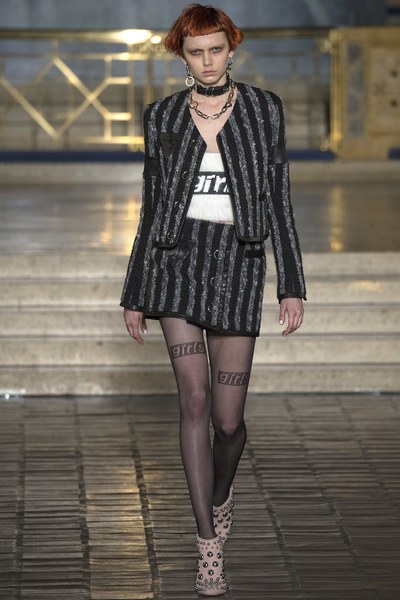
Thierry Mugler’s 2017 Resort collection Photo: Courtesy of MuglerPuffer Coat by Vivenne Westwood Photo: Getty
Jacqueline Colette Prosper, yummicoco.com
- 8 years ago
-
Is That You? and Fatima, both opening on Friday, explore different kinds of love in very different ways. The first film follows a middle-aged man’s attempt to rekindle a past relationship; the second is a look at an struggling immigrant’s devotion to her children.
“Dear Rachel: Is that you?,” writes Ronnie (a soulful Alon Aboutboul) to an ex-girlfriend he knew 30 years ago. Though they haven’t been in touch since she left their native Israel for the United States, he thinks about her often. So when he’s fired from his projectionist job and is compensated with plane ticket to America, Ronnie’s path is laid out for him.
Is That You?, from Israeli filmmaker Dani Menkin (Dolphin Boy, 39 Pounds of Love), is an off-beat drama that makes up for its somewhat ramshackle quality and quirk overload with genuine warmth and nice performances from its leads. Though its motif about trying to reconnect with the past gets a bit repetitive at times, Is That You? is a poetic, not altogether predictable meditation on the theme, an admirable achievement in itself.
When Ronnie arrives in upstate New York, he stays with his outgoing car salesman brother, Jacob (Rani Bleier). Coincidentally, Jacob has recently run into Rachel (Suzanne Sadler), who asked about Ronnie. With the help of Jacob’s son, they find several women named Rachel Golan on Facebook and narrow down Ronnie’s search. The couple once made a pact to be together on her 60th birthday, which happens to be in two days. Jacob gives Ronnie a car and the advice, “Sometimes there are dreams against all logic; you just have to make them happen.”
After an unfruitful visit to Rachel’s old address, Ronnie’s car breaks down. A pixieish young woman named Myla (Naruna Kaplan de Macedo) agrees to help him if she can include him in the documentary she is making about regrets called The Road Not Taken (yes, coincidences abound). He reluctantly agrees and the two pursue several false leads, making a stop at one point to visit Myla’s ailing grandmother, who mistakes Ronnie for someone she once knew, asking him, “Is that you?” Along the way, Myla interviews everyone they encounter, including a cop who pulls them over on the highway. The resulting footage of regular folks speaking honestly about their lives provides some nice interludes.
As their road trip continues, Ronnie and Myla’s odd friendship becomes almost uncomfortably affectionate, until we realize it has taken on a father-daughter dynamic. This is confirmed by the revelation of Myla’s personal reasons for making The Road Not Taken, after the two spend an evening drinking at a motel pool.
Though the last part of the film is a bit drawn out, it is also the most moving, as Ronnie finds what he’s looking for (as does Myla). It’s a satisfying conclusion to a good-hearted film that tackles an issue we’ve all pondered at some point and dares to provide a solid outcome.
—————————————————————————————————————————————
A low-key, slice-of-life movie, Philippe Faucon’s Fatima charts the travails of a divorced, Algerian mother of two teenage daughters living in Lyon, France. Based on Fatima Elayoubi’s collection of autobiographical poems, Fatima stars Soria Zeroual as its stoic title character, a hard-working immigrant who is unwavering in her devotion to studious older daughter Nesrine (Zita Hanrot) and the rebellious Souad (Kenza-Noah Aïche), despite various frustrations. A series of naturalistic vignettes show the escalating struggles and hard-won victories of these characters; it makes for a compelling narrative.
Early in the film, we see the family dynamic in conversations between Fatima and her daughters: she speaks Arabic and they answer in French. The girls (especially Souad) are acclimated to western life, while the headscarf-wearing Fatima struggles with the language and culture, as well as criticisms from fellow North African women who resent the fact that Nesrine attends college. To support her daughter’s medical studies, Fatima cleans the apartment of a French woman, in addition to her regular job cleaning commercial spaces. Though her employer seems fair enough, Fatima believes the woman is testing her by leaving money unattended. In an earlier incident involving apartment-hunting with Nesrine, Fatima likewise suspected discrimination. As in real life, the answer isn’t always clear.
The girls’ westernized father, who has remarried, sees them occasionally but is nowhere as involved as Fatima. As the film progresses, arguments escalate between Fatima and the sullen, smart-alecky Souad, with mother warning daughter to cover up and be more careful, so as not to cause talk. Ironically, it’s the more conservative, hard-working Nesrine who is the brunt of gossip among Fatima’s acquaintances.
After a frustrating parent-teacher meeting, Fatima admits to a co-worker that she feels inadequate due to her limited education. She enrolls in a French class and soon begins speaking the language at home and communicating more to her employer. Meanwhile, Nesrine struggles both with her studies and neighbors who accuse her of snubbing them. A nice-seeming boy flirts with her on the bus but, unlike Souad, she spurns male attention, until her ever-perceptive mother counsels otherwise. As her own stresses build, Fatima describes her life in increasingly poetic entries she writes in a notebook, clearly a crucial outlet.
Things come to a head as Souad blows up at her mother, Nesrine breaks down over the strain of her studies and the distracted Fatima sustains an injury. Eventually, she finds comfort in a young female doctor to whom she reads one of her poems in its entirety. It’s a surprisingly poignant moment in this straightforward film, which makes it all the more powerful.
Is That You? opens Friday at Cinema Village; Fatima opens Friday at the Film Society of Lincoln Center.
—Marina Zogbi





